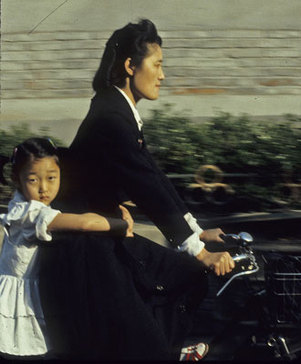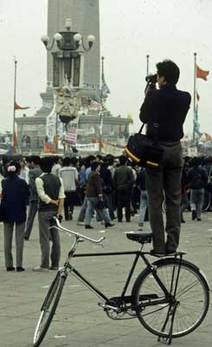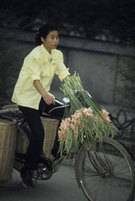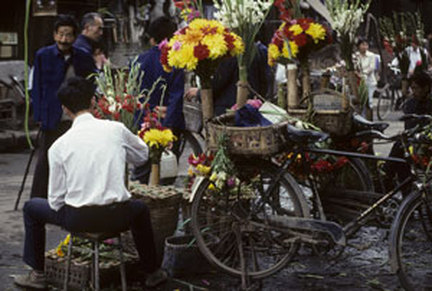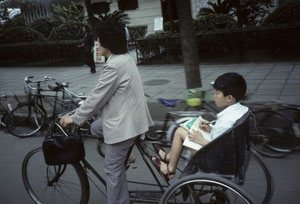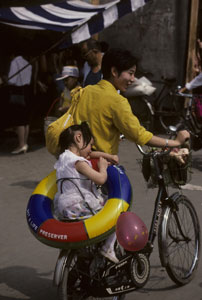The Wheels of Freedom: Bicycles in China
by Fred Strebeigh
published originally in Bicycling, April 1991 (photography by Fred Strebeigh)
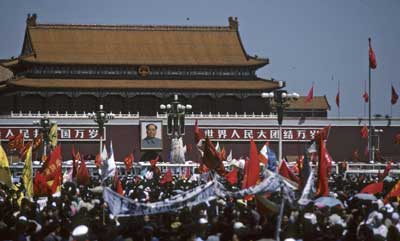
Tiananmen Square, Beijing, May 1989 (Fred Strebeigh)
"Hello." She appeared at my right shoulder, her face inches from mine. We were cycling together, though I had never seen her before. We rode side-by-side through the city of Beijing, and around us streamed thousands of bicycles with red banners flying. Beijing was in revolt. And as we rode together we broke the law.
I had gone to China with an odd goal: to learn a bit about what the bicycle means to people who live in a country with only a few thousand privately-owned cars but some 220 million cycles--vastly more than any other nation. And I had arrived at an odd time.
My first day in China was also the first day, two years ago, of what became known as Beijing Spring of 1989. As I awoke, students and citizens by the hundreds of thousands were flowing from all over Beijing to Tiananmen Square, the vast plaza at the city's heart, creating the largest spontaneous demonstration in the history of China and perhaps the world.
I had gone to China with an odd goal: to learn a bit about what the bicycle means to people who live in a country with only a few thousand privately-owned cars but some 220 million cycles--vastly more than any other nation. And I had arrived at an odd time.
My first day in China was also the first day, two years ago, of what became known as Beijing Spring of 1989. As I awoke, students and citizens by the hundreds of thousands were flowing from all over Beijing to Tiananmen Square, the vast plaza at the city's heart, creating the largest spontaneous demonstration in the history of China and perhaps the world.
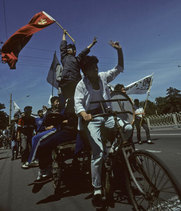
Riding to Tiananmen, May 1989
They came on foot and bus and subway, of course, but mostly they came by bicycle, calling for freedom. (I could see why bicycles are forbidden in the capital of North Korea, China's more repressive neighbor. Its government reportedly fears that bikes give people too much independence.)
Within hours of my arrival in Beijing, bicycles became more crucial than ever. Buses stopped. Subways shut. Taxis struck. But on flowed the bikes of Beijing. Bicyclists carried messages from university to university. Tricyclists rushed round delivering food to demonstrators. Families and schoolmates and couples and commuters smiled and waved as they rode, in twos and threes and throngs.
On my own bicycle, hesitant at first and then lost in the cycling masses, I roamed freely. Daily I rode to Tiananmen Square, with its mood of carnival, its students from all regions, and its uncountable cycles. Bicycles and tricycles became flag holders and tent supporters. They became tea dispensers and cold-drink stands.
Within hours of my arrival in Beijing, bicycles became more crucial than ever. Buses stopped. Subways shut. Taxis struck. But on flowed the bikes of Beijing. Bicyclists carried messages from university to university. Tricyclists rushed round delivering food to demonstrators. Families and schoolmates and couples and commuters smiled and waved as they rode, in twos and threes and throngs.
On my own bicycle, hesitant at first and then lost in the cycling masses, I roamed freely. Daily I rode to Tiananmen Square, with its mood of carnival, its students from all regions, and its uncountable cycles. Bicycles and tricycles became flag holders and tent supporters. They became tea dispensers and cold-drink stands.
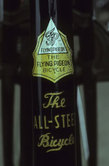
Flying Pigeon, the All-Steel Bicycle
Riding among the bicycles of Beijing, I began to recognize dozens of China's famous brands: Golden Lion and Mountain River, Plum Flower and Chrysanthemum, Red Flag and Red Cotton, Flying Arrival and Flying Pigeon, Pheasant and Phoenix and Forever. Long and stately bicycles, recalling decades past, they possessed the rake and sheer and grace that today I associate less with cycling than with yachting. I felt as if I were cruising, on the wake of clippers like Red Jacket or Flying Cloud, in a regatta of tall ships.
Then the Chinese government declared martial law. It forbade citizens to attend the student demonstrations and forbade foreigners, like me, to visit Tiananmen or talk to students. It sent its army in a first push into the city, but citizens peacefully blocked its way. My Chinese hosts (I had been invited to lecture at a couple of universities) warned me to obey the government, and I said I would try.
Then the Chinese government declared martial law. It forbade citizens to attend the student demonstrations and forbade foreigners, like me, to visit Tiananmen or talk to students. It sent its army in a first push into the city, but citizens peacefully blocked its way. My Chinese hosts (I had been invited to lecture at a couple of universities) warned me to obey the government, and I said I would try.
In the second day under martial law, as I was riding down one of Beijing's leafy boulevards, suddenly a young woman appeared at my shoulder. She said "hello," and we were cycling together.
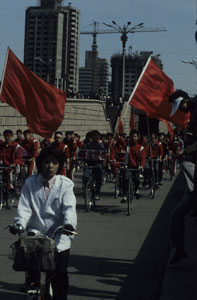
Riding to Tiananmen, May 1989
I had been rolling at Beijing speed, eight miles an hour--in synch with commuters, demonstrators, and vegetable haulers. To catch me she had accelerated, maybe to eight-and-a-half miles an hour.
"What," she wanted to know, did I "think about the students?" She wore tinted glasses, a shy smile in a radiant face, a lab coat--she was a science student, and by law we were forbidden to talk.
"I think what they are doing is very brave," I said, "and very scary." And so we became two petty criminals, riding handlebar-to-handlebar.
We floated together and others floated past. But they travelled fractions of a pedal-turn faster or fractions slower, and we were left alone in talk, our handlebars occasionally nudging each other, in the bizarre intimacy of Beijing cycling. I worried aloud about the Chinese Army--now half a mile to our west, still blocked but still pressing towards us. She praised George Washington. We would not have talked so freely in a restaurant or hotel, I realized; police could have demanded our names. But here we were just two bicycles lost in the mass--the most private place in Beijing.
Ahead of us appeared Tiananmen Square, where some of her classmates had been starving themselves in protest and others had been singing "We Shall Overcome." Within moments, she drifted south and I north. Soon I was at the American embassy. They warned me against talking to students.
To stay in Beijing, I decided, was to endanger anyone I met. And so I resolved to travel out from the capital and return later, in order to talk about bicycles in a time of greater calm and, I hoped, greater freedom.
"What," she wanted to know, did I "think about the students?" She wore tinted glasses, a shy smile in a radiant face, a lab coat--she was a science student, and by law we were forbidden to talk.
"I think what they are doing is very brave," I said, "and very scary." And so we became two petty criminals, riding handlebar-to-handlebar.
We floated together and others floated past. But they travelled fractions of a pedal-turn faster or fractions slower, and we were left alone in talk, our handlebars occasionally nudging each other, in the bizarre intimacy of Beijing cycling. I worried aloud about the Chinese Army--now half a mile to our west, still blocked but still pressing towards us. She praised George Washington. We would not have talked so freely in a restaurant or hotel, I realized; police could have demanded our names. But here we were just two bicycles lost in the mass--the most private place in Beijing.
Ahead of us appeared Tiananmen Square, where some of her classmates had been starving themselves in protest and others had been singing "We Shall Overcome." Within moments, she drifted south and I north. Soon I was at the American embassy. They warned me against talking to students.
To stay in Beijing, I decided, was to endanger anyone I met. And so I resolved to travel out from the capital and return later, in order to talk about bicycles in a time of greater calm and, I hoped, greater freedom.
One of the people I most wanted to meet outside Beijing was a student in Sichuan Province named Fang Hui. The year before, she had become the first Chinese woman to ride a bicycle from Chengdu, the capital of Sichuan in central China, to Lhasa, the capital of Tibet--bumping for thirteen hundred miles over one of China's worst roads, a sawtooth of rock tracks and mountain passes which reach altitudes above 15,000 feet. In recognition, China honored her as one of the nation's "Ten Brave Young People."
I didn't care much about Fang Hui's honors. I cared more about her motivations, her goals. I guess I expected her to be a hot but somewhat dull athlete, the sort who wins Chinese honors by excelling in volleyball. When we met at her university in Chengdu, where she is a graduate student in English, she surprised me.
As we pedaled through the streets of Chengdu, I asked Fang Hui if she had always been a cyclist. Not really, she said. Before her trip she had not owned a bicycle. The day before departing for Tibet she bought an old, single-speed Arched Eyebrow for 75 yuan ($20). She then taught herself to ride, over a thousand miles of mountains.
I asked how she chose Tibet. She said she had answered a poster advertisement. I was shocked. So, apparently, were the five men, mostly teachers from a local school, who had planned the trip and posted invitations for fellow travelers. Only Fang Hui accepted.
The men doubted she could reach Tibet, perhaps because she looked like a pudgy schoolgirl. Uphill she always rode more slowly than they, falling miles behind. Downhill, because her old bike had wretched brakes, she squeezed its levers with all her strength as the Arched Eyebrow hurtled down pitted roads. "I went very fast," she said. "I felt as if I would become light." At the end of each day of clinging to her brake levers, her hands were so cramped she could not open them.
Eventually, the men admitted that her strength egged them on. "If even a girl can do this," they said, "how shameful for a man to give up."
Fang Hui had not really worried about giving up on the journey, she told me. But, earlier, she had worried about giving up on life. "Before," she said, "yesterday, today, tomorrow were all alike--so dull. What I most wanted was to meet something unexpected."
Not just the road's pain but also its loneliness changed Fang Hui. At remote outposts she would meet soldiers, mere isolated boys, who would write love letters that followed her up the Lhasa road, carried by lone truck drivers. In yet remoter terrain she would ride half a day, she recalled, and "not see a single man. So when I heard a dog bark, it would arouse a tender feeling--a reminder of the human world. When I came back, people all said I had changed. Now I can find something new in every day." And now at night, she added with glee, "sometimes I dream I am riding very fast downhill."
As I rode through Chengdu, sometimes talking with Fang Hui or with other university students and teachers, I began to see that the bicycle offered an escape not just from everyday life. It also offered escape within everyday life.
One day as Fang Hui and I rode through a crush of cyclists, a young couple passed us riding two bicycles side-by-side. They rode pedal-to-pedal and almost arm-in-arm. At first the girl rode with her left hand on the boy's right, controlling his hand and handlebar, steering them both. Then he moved his hand to round the small of her back. They reminded me of partners in a waltz.
The boy lowered his hand to the girl's bicycle seat and leaned to her, and as they rode they whispered. In the often-dehumanizing crush of urban China, two bicycles had made space for romance. Fang Hui said that young "lovers" often ride so utterly together, so alone in their world.
Providing such measures of human dignity, one professor told me, was one of the bicycle's gifts to China--and particularly to people like his parents, who were "peasants" (the term in China for all people who work the land). Here in the center of China's richest farmlands, he said, I could watch the bicycle making life less hard.
I didn't care much about Fang Hui's honors. I cared more about her motivations, her goals. I guess I expected her to be a hot but somewhat dull athlete, the sort who wins Chinese honors by excelling in volleyball. When we met at her university in Chengdu, where she is a graduate student in English, she surprised me.
As we pedaled through the streets of Chengdu, I asked Fang Hui if she had always been a cyclist. Not really, she said. Before her trip she had not owned a bicycle. The day before departing for Tibet she bought an old, single-speed Arched Eyebrow for 75 yuan ($20). She then taught herself to ride, over a thousand miles of mountains.
I asked how she chose Tibet. She said she had answered a poster advertisement. I was shocked. So, apparently, were the five men, mostly teachers from a local school, who had planned the trip and posted invitations for fellow travelers. Only Fang Hui accepted.
The men doubted she could reach Tibet, perhaps because she looked like a pudgy schoolgirl. Uphill she always rode more slowly than they, falling miles behind. Downhill, because her old bike had wretched brakes, she squeezed its levers with all her strength as the Arched Eyebrow hurtled down pitted roads. "I went very fast," she said. "I felt as if I would become light." At the end of each day of clinging to her brake levers, her hands were so cramped she could not open them.
Eventually, the men admitted that her strength egged them on. "If even a girl can do this," they said, "how shameful for a man to give up."
Fang Hui had not really worried about giving up on the journey, she told me. But, earlier, she had worried about giving up on life. "Before," she said, "yesterday, today, tomorrow were all alike--so dull. What I most wanted was to meet something unexpected."
Not just the road's pain but also its loneliness changed Fang Hui. At remote outposts she would meet soldiers, mere isolated boys, who would write love letters that followed her up the Lhasa road, carried by lone truck drivers. In yet remoter terrain she would ride half a day, she recalled, and "not see a single man. So when I heard a dog bark, it would arouse a tender feeling--a reminder of the human world. When I came back, people all said I had changed. Now I can find something new in every day." And now at night, she added with glee, "sometimes I dream I am riding very fast downhill."
As I rode through Chengdu, sometimes talking with Fang Hui or with other university students and teachers, I began to see that the bicycle offered an escape not just from everyday life. It also offered escape within everyday life.
One day as Fang Hui and I rode through a crush of cyclists, a young couple passed us riding two bicycles side-by-side. They rode pedal-to-pedal and almost arm-in-arm. At first the girl rode with her left hand on the boy's right, controlling his hand and handlebar, steering them both. Then he moved his hand to round the small of her back. They reminded me of partners in a waltz.
The boy lowered his hand to the girl's bicycle seat and leaned to her, and as they rode they whispered. In the often-dehumanizing crush of urban China, two bicycles had made space for romance. Fang Hui said that young "lovers" often ride so utterly together, so alone in their world.
Providing such measures of human dignity, one professor told me, was one of the bicycle's gifts to China--and particularly to people like his parents, who were "peasants" (the term in China for all people who work the land). Here in the center of China's richest farmlands, he said, I could watch the bicycle making life less hard.
The professor told me that peasants in his parents' remote village always refer to the bicycle, appreciatively, as the "foreign horse." The government opposes the name, he said, but it helps explain the history of the bicycle in China. The first bicycle arrived in 1886, carrying Thomas Stevens, a young San Franciscan who was completing the first cycling journey around the world. With its huge front wheel and small rear one, his penny-farthing cycle must have looked very foreign but, unlike a good horse, not very practical.
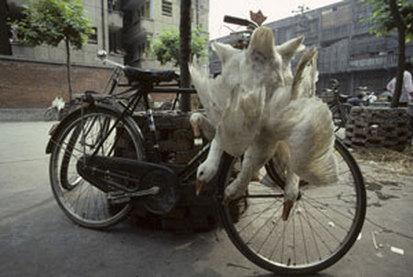
Geese, just purchased to go home, Chengdu market
The first practical bicycle to reach China came in 1891, again transporting a round-the-world cyclist. By the early 20th century, the foreign horse had won the fascination of China's last emperor, the young Puyi, who rode one around his palace, Beijing's "Forbidden City."
Slowly cycling trickled down from the throne toward the masses. By the 1940s China's bicycle factories were producing a vehicle like today's most common model, a virtual twin of England's stately Raleigh Tourist.
In the years before the Chinese revolution of 1949, the professor told me, almost everyone called the bicycle "foreign horse," because foreign suggested both "modern" and "admirable." Since peasants carried most goods on their backs, they particularly admired the bicycle. Every peasant longed to shift his burden to the back of a foreign horse--a longing frustrated by high price and short supply.
Then came the revolution of 1949. Hoping to "raise the people's dignity," the professor continued, the young government made two decisions. Happily, in an effort to give wheels to an impoverished population, it encouraged bicycle production, which began doubling and redoubling. But sadly, because the old name suggested blind worship of foreign things, the government banned the lyrical phrase "foreign horse" (which, pronounced yang ma in Chinese, resounds like a ringing gong). The government imposed, instead, the unpoetic "self-running cart" (zi xing che in Chinese, which sounds like a dental problem).
Not surprisingly, the cycle's foreign resonance remains. Peasants in remote villages still pedal "foreign horses." And many Chinese factories, seeking a touch of class, still adorn their bicycles with prominent English names: "Forever" or "Light Roadster" or, on the most celebrated of foreign horses, "Flying Pigeon--The All Steel Bicycle." (When George Bush made his first Presidential visit to China, his welcoming gift from the nation was a pair of Flying Pigeons.)
Slowly cycling trickled down from the throne toward the masses. By the 1940s China's bicycle factories were producing a vehicle like today's most common model, a virtual twin of England's stately Raleigh Tourist.
In the years before the Chinese revolution of 1949, the professor told me, almost everyone called the bicycle "foreign horse," because foreign suggested both "modern" and "admirable." Since peasants carried most goods on their backs, they particularly admired the bicycle. Every peasant longed to shift his burden to the back of a foreign horse--a longing frustrated by high price and short supply.
Then came the revolution of 1949. Hoping to "raise the people's dignity," the professor continued, the young government made two decisions. Happily, in an effort to give wheels to an impoverished population, it encouraged bicycle production, which began doubling and redoubling. But sadly, because the old name suggested blind worship of foreign things, the government banned the lyrical phrase "foreign horse" (which, pronounced yang ma in Chinese, resounds like a ringing gong). The government imposed, instead, the unpoetic "self-running cart" (zi xing che in Chinese, which sounds like a dental problem).
Not surprisingly, the cycle's foreign resonance remains. Peasants in remote villages still pedal "foreign horses." And many Chinese factories, seeking a touch of class, still adorn their bicycles with prominent English names: "Forever" or "Light Roadster" or, on the most celebrated of foreign horses, "Flying Pigeon--The All Steel Bicycle." (When George Bush made his first Presidential visit to China, his welcoming gift from the nation was a pair of Flying Pigeons.)
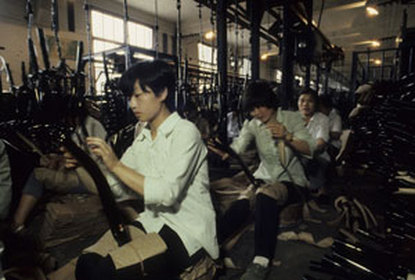
Flying Pigeon Bicycle Factory on outskirts of Chengdu
A regional branch of the Flying Pigeon Bicycle Factory lies an hour's ride from the center of Chengdu, and one day I was given a tour of its old-style assembly line by Jiang Guoji, the factory's present director--the first ever elected by its workers. He spoke with the ease of a manager whose workers' trust his judgment and whose society trusts his product.
Since Jiang Guoji's factory sits in the middle of China's best farmland, he and his co-workers decided to specialize in what Jiang called the "ZA-62" or "Reinforced Flying Pigeon." This bike, which I came to think of as the "Peasant Pigeon," comes with massive tubing, a formidable rack, a second set of forks to hold the front wheels, and--probably unique among Chinese bicycles--a three-year warranty. It contains 68 pounds of steel which, together with some leather and rubber, brings its total weight above 72 pounds--three times that of my average American bike.
Jiang Guoji's factory has raised production steadily, along with all Chinese cycle factories, creating an unprecedented problem. The year before my visit, Chinese bicycle production reached 42 million cycles--dwarfing any other nation's output and, more significantly, overtaking Chinese demand for the first time in history. For years, bicycles had been rationed, and families had longed to own a good one. Now "if a person has money, he can buy," Jiang told me, with a mix of pride and regret--because prices have begun dropping and "bicycle factories have real competition."
In response, Jiang said, he was trying to spur international demand for Peasant Pigeons. Looking for good "propaganda," two years earlier he donated Peasant Pigeons to five local riders who wanted to go around the world. Alas, one had been run down by a truck in Pakistan. But the other four were riding on, circling the globe back towards his factory. He expected his 72-pound Pigeons home within a year, still under warranty. (He added that, despite transport costs and import duties, he would gladly sell Peasant Pigeons wholesale in America for less than a dollar a pound.)
Since Jiang Guoji's factory sits in the middle of China's best farmland, he and his co-workers decided to specialize in what Jiang called the "ZA-62" or "Reinforced Flying Pigeon." This bike, which I came to think of as the "Peasant Pigeon," comes with massive tubing, a formidable rack, a second set of forks to hold the front wheels, and--probably unique among Chinese bicycles--a three-year warranty. It contains 68 pounds of steel which, together with some leather and rubber, brings its total weight above 72 pounds--three times that of my average American bike.
Jiang Guoji's factory has raised production steadily, along with all Chinese cycle factories, creating an unprecedented problem. The year before my visit, Chinese bicycle production reached 42 million cycles--dwarfing any other nation's output and, more significantly, overtaking Chinese demand for the first time in history. For years, bicycles had been rationed, and families had longed to own a good one. Now "if a person has money, he can buy," Jiang told me, with a mix of pride and regret--because prices have begun dropping and "bicycle factories have real competition."
In response, Jiang said, he was trying to spur international demand for Peasant Pigeons. Looking for good "propaganda," two years earlier he donated Peasant Pigeons to five local riders who wanted to go around the world. Alas, one had been run down by a truck in Pakistan. But the other four were riding on, circling the globe back towards his factory. He expected his 72-pound Pigeons home within a year, still under warranty. (He added that, despite transport costs and import duties, he would gladly sell Peasant Pigeons wholesale in America for less than a dollar a pound.)
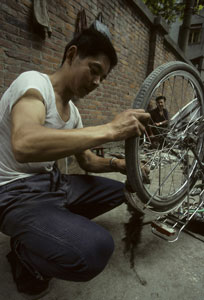
Fast brake repair, Chengdu
All Chinese bicycles--whether sturdy Flying Pigeons or sad Arched Eyebrows--must survive long after their warranties have expired. To help them along, repairmen have set up roadside stands in every city. Entering the business proves simple. A would-be repairman chooses a site, asks the city to license it to him, and lays down his tools. He then puts up his advertisement--a circle of overlapping innertubes, colored black and deep pink, perhaps hung on a tree limb.
Some Chinese portray repairmen in a style that outdoes American caricatures of car mechanics. Most of my Chinese acquaintances knew one repairman they relied on and dozens they distrusted. One university professor insisted that underemployed repairmen scatter tacks to puncture passing tires and inflate profits.
Another professor invited me to meet her revered neighborhood repairman. Since he worked incessantly and had little time for chatter, she devised a ruse to buy time for asking questions: we would take him her Flying Arrival, which had a useless rear brake.
We found him at the back gate of her university beneath a circle of innertubes. When my friend arrived, the repairman put aside a Phoenix he was polishing and greeted her as a long-term client. She presented the brake problem. He took a quick look, produced two sets of pliers, loosened a nut, tightened a cable, tensioned a spring and, after 30 seconds of work, handed the bike back to her--fixed. He refused payment. The job was too small. He resumed polishing the Phoenix.
Though her ruse had failed, the professor pressed forward: How did he become a repairman? Three years ago when he was twenty-seven, he told us, he stopped working his family's farm because the land was small and the family had more than enough laborers--including his wife, their three children, his two sisters and two brothers, and their aging parents. He still lives on the farm but commutes three miles to the city on his Forever. He works seven days a week, from 9 am to 8 pm, except when it rains.
He likes bike repair because it "makes money," he said, emphasizing the word as if it were a novelty. Back on the farm, where he hopes never to work again, he "just produced crops," which sold for "not-so-much money."
When we asked him how much he made in a month, he told us 800 yuan ($216). The professor gasped. To me she said, quietly, "That's five university professors!" Still, she seemed to believe him. She pointed out to me that he had paid the government's penalty for having three children. The penalty in recent years has run as high as 2,000 yuan ($540), she said, too much for most professors--but not for an industrious bike fixer.
As I talked to more repairmen, I saw that their job may be the freest in China. A hard worker needed only a street corner and a few tools. Before his eyes bikes would inevitably break down and, if he was skilled, clients would multiply. Bicycle repair seemed to offer an extension of what the bike itself offered and what so many Chinese sought: modest dignity, new choices, ample freedom.
Some Chinese portray repairmen in a style that outdoes American caricatures of car mechanics. Most of my Chinese acquaintances knew one repairman they relied on and dozens they distrusted. One university professor insisted that underemployed repairmen scatter tacks to puncture passing tires and inflate profits.
Another professor invited me to meet her revered neighborhood repairman. Since he worked incessantly and had little time for chatter, she devised a ruse to buy time for asking questions: we would take him her Flying Arrival, which had a useless rear brake.
We found him at the back gate of her university beneath a circle of innertubes. When my friend arrived, the repairman put aside a Phoenix he was polishing and greeted her as a long-term client. She presented the brake problem. He took a quick look, produced two sets of pliers, loosened a nut, tightened a cable, tensioned a spring and, after 30 seconds of work, handed the bike back to her--fixed. He refused payment. The job was too small. He resumed polishing the Phoenix.
Though her ruse had failed, the professor pressed forward: How did he become a repairman? Three years ago when he was twenty-seven, he told us, he stopped working his family's farm because the land was small and the family had more than enough laborers--including his wife, their three children, his two sisters and two brothers, and their aging parents. He still lives on the farm but commutes three miles to the city on his Forever. He works seven days a week, from 9 am to 8 pm, except when it rains.
He likes bike repair because it "makes money," he said, emphasizing the word as if it were a novelty. Back on the farm, where he hopes never to work again, he "just produced crops," which sold for "not-so-much money."
When we asked him how much he made in a month, he told us 800 yuan ($216). The professor gasped. To me she said, quietly, "That's five university professors!" Still, she seemed to believe him. She pointed out to me that he had paid the government's penalty for having three children. The penalty in recent years has run as high as 2,000 yuan ($540), she said, too much for most professors--but not for an industrious bike fixer.
As I talked to more repairmen, I saw that their job may be the freest in China. A hard worker needed only a street corner and a few tools. Before his eyes bikes would inevitably break down and, if he was skilled, clients would multiply. Bicycle repair seemed to offer an extension of what the bike itself offered and what so many Chinese sought: modest dignity, new choices, ample freedom.
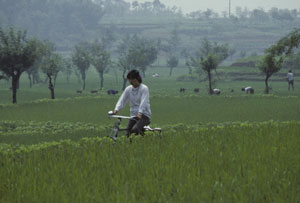
Riding the rice fields of Emei, south of Chengdu
The farm country outside Chengdu, contrary to the complaints of one peasant-turned-repairman, generates much of the new agricultural wealth enjoyed by the Chinese people. In early June, by train and by bicycle, I travelled to the southern mountains that rim this rich agricultural bowl within Sichuan province. There I was the guest at another university, tucked in verdant hills.
During my stay, one teacher lent me an old Peasant Pigeon--one well past its warranty. I rode it daily over farm tracks of rut and rock that would have jolted the nuts off my light American bike. The big Pigeon just bobbed along, high and easy.
One midday while I was exploring narrow paths through emerald-colored rice paddies, two girls whizzed past me, riding double on a black Forever. Both wore red uniforms and one carried an abacus--students dashing home for lunch.
During my stay, one teacher lent me an old Peasant Pigeon--one well past its warranty. I rode it daily over farm tracks of rut and rock that would have jolted the nuts off my light American bike. The big Pigeon just bobbed along, high and easy.
One midday while I was exploring narrow paths through emerald-colored rice paddies, two girls whizzed past me, riding double on a black Forever. Both wore red uniforms and one carried an abacus--students dashing home for lunch.
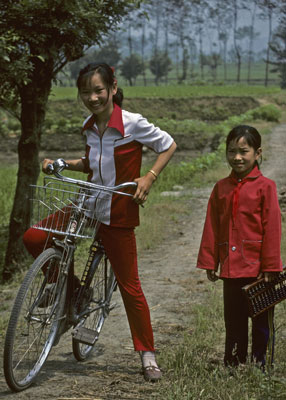
Jianmei with Forever; Liyia with abacus
With me was a professor who was fluent not only in English but also the quite-obscure local dialect. She suggested we follow the students so I could meet a "peasant family."
We travelled through flooded paddies, past water buffaloes, up to a newly-built home that stretched around a cement courtyard, and found the older of the two girls talking with her mother next to their vegetable garden. The professor introduced us. Their mother, Mrs. Fang, invited us for tea and introduced her daughters: Liyia, 3rd-grader and bicycle passenger, and Jianmei, 6th-grader and bicyclist. Because Jianmei's Forever still had protective wrapping paper on its top bar, as if it had just come from the store, I asked if it was new.
Jianmei, who was gulping down rice in preparation for her afternoon at school, said proudly that she won it just last year. Her mother explained that the family offers their daughters prizes for each year that they sustain grades of 90% or better. In autumn each daughter names a prize she wants, and then for the rest of the school year she tries to win it. In 3rd grade Jianmei won a set of nice clothes; in 4th grade, a golden wristwatch; in 5th grade, the Forever. (I said to the professor, in English, "Are you sure we're talking to peasants?")
Mrs. Fang then led us through her tiled kitchen to a room that held, along with awards won by Jianmei for track and basketball, another full-sized bicycle--a cherry-red "Cuckoo," also still wrapped to protect its paint. It was Jianmei's earlier bike. I was astonished; ten years ago here, the professor had told me, only one family in ten could afford even a single bicycle.
Jianmei explained that she wanted the Forever because it was strong and smooth enough to carry her little sister. With it, she rides not just to school but up to the university, off to a nearby temple, even to a town 22 miles away to see the world's largest carved Buddha.
As we walked away from the Fang household--so imbued with work and reward and independence--I said to the professor: "Don't you wish you grew up in a place like that?" A bit later I thought to myself: "I did grow up in a place like that." Riding off to school, studying hard, cycling ten and twenty miles on a whim--this was like being back in sixth grade in my small home town.
On the same day I talked with the Fang family, stories of the Beijing massacre--of hundreds or perhaps thousands of citizens killed by army troops and tanks--were reaching our remote region. Soon travelers arrived with tales of killing in other provincial cities. Students began to flee our rural campus, fearing the army would next descend on them. I returned to Chengdu.
There, I tried to continue the work I had planned--looking for the city's used bicycle market, avoiding the army troops who had arrived to quell outbursts, gathering statistics on bicycle ownership. But I could not concentrate.
We travelled through flooded paddies, past water buffaloes, up to a newly-built home that stretched around a cement courtyard, and found the older of the two girls talking with her mother next to their vegetable garden. The professor introduced us. Their mother, Mrs. Fang, invited us for tea and introduced her daughters: Liyia, 3rd-grader and bicycle passenger, and Jianmei, 6th-grader and bicyclist. Because Jianmei's Forever still had protective wrapping paper on its top bar, as if it had just come from the store, I asked if it was new.
Jianmei, who was gulping down rice in preparation for her afternoon at school, said proudly that she won it just last year. Her mother explained that the family offers their daughters prizes for each year that they sustain grades of 90% or better. In autumn each daughter names a prize she wants, and then for the rest of the school year she tries to win it. In 3rd grade Jianmei won a set of nice clothes; in 4th grade, a golden wristwatch; in 5th grade, the Forever. (I said to the professor, in English, "Are you sure we're talking to peasants?")
Mrs. Fang then led us through her tiled kitchen to a room that held, along with awards won by Jianmei for track and basketball, another full-sized bicycle--a cherry-red "Cuckoo," also still wrapped to protect its paint. It was Jianmei's earlier bike. I was astonished; ten years ago here, the professor had told me, only one family in ten could afford even a single bicycle.
Jianmei explained that she wanted the Forever because it was strong and smooth enough to carry her little sister. With it, she rides not just to school but up to the university, off to a nearby temple, even to a town 22 miles away to see the world's largest carved Buddha.
As we walked away from the Fang household--so imbued with work and reward and independence--I said to the professor: "Don't you wish you grew up in a place like that?" A bit later I thought to myself: "I did grow up in a place like that." Riding off to school, studying hard, cycling ten and twenty miles on a whim--this was like being back in sixth grade in my small home town.
On the same day I talked with the Fang family, stories of the Beijing massacre--of hundreds or perhaps thousands of citizens killed by army troops and tanks--were reaching our remote region. Soon travelers arrived with tales of killing in other provincial cities. Students began to flee our rural campus, fearing the army would next descend on them. I returned to Chengdu.
There, I tried to continue the work I had planned--looking for the city's used bicycle market, avoiding the army troops who had arrived to quell outbursts, gathering statistics on bicycle ownership. But I could not concentrate.
My mind was on Beijing. Finally I decided to return, to what just days before had been the world's most exuberant city.
Again I rode its leafy boulevards, but no excited voice at my shoulder asked what I thought of the students. No banners waved. No people smiled. All faces seemed as if carved, years ago, in soft stone--at once fixed and badly weathered.
Each evening, Beijing television proudly showed the now-barren Tiananmen Square, cleared of all students and, for that matter, all life. Understandably, the TV cameras did not show what people in Beijing had seen: citizens trying to stop tanks by shoving bicycles at them, flatbed tricycles turned into ambulances for slaughtered children. Less understandably, the cameras often began their pan across the square with an image of a pile of crumpled bicycles.
That odd image haunted me for months, long after I had left China. Only slowly did I realize that the government had chosen that scene precisely. The government cameras wanted to show more than a few crushed machines. They wanted to show crushed dignity, crushed humanity, crushed freedom--so much that the bicycle means in China.
And finally I realized that of course the old men who cling to power in China would want to show off the crumpled bicycles of the young men and women who had called for freedom. How terrifying it must have been, to those old men, to see millions of young people cycling toward them--so independent, so alive, so free--all those wheels turning and turning beyond the control of fear or fiat. Of course those old men would want to crush the cycles of the young. For they would know too well that history itself runs in cycles--sometimes foreign horses, sometimes self-running carts, always wheels of change. How sad: Four decades earlier these same old men, seeking to "raise the people's dignity," had set rolling the cycles of modern China. And then in a few days of a Beijing spring they sought to crush, all at once, cycles and dignity and change together. They might as easily have sought to stop the circling, round the sun, of earth's revolution. For as each spring comes round, the old fade and the young quicken. And every day throughout China, the wheels of freedom roll.
Again I rode its leafy boulevards, but no excited voice at my shoulder asked what I thought of the students. No banners waved. No people smiled. All faces seemed as if carved, years ago, in soft stone--at once fixed and badly weathered.
Each evening, Beijing television proudly showed the now-barren Tiananmen Square, cleared of all students and, for that matter, all life. Understandably, the TV cameras did not show what people in Beijing had seen: citizens trying to stop tanks by shoving bicycles at them, flatbed tricycles turned into ambulances for slaughtered children. Less understandably, the cameras often began their pan across the square with an image of a pile of crumpled bicycles.
That odd image haunted me for months, long after I had left China. Only slowly did I realize that the government had chosen that scene precisely. The government cameras wanted to show more than a few crushed machines. They wanted to show crushed dignity, crushed humanity, crushed freedom--so much that the bicycle means in China.
And finally I realized that of course the old men who cling to power in China would want to show off the crumpled bicycles of the young men and women who had called for freedom. How terrifying it must have been, to those old men, to see millions of young people cycling toward them--so independent, so alive, so free--all those wheels turning and turning beyond the control of fear or fiat. Of course those old men would want to crush the cycles of the young. For they would know too well that history itself runs in cycles--sometimes foreign horses, sometimes self-running carts, always wheels of change. How sad: Four decades earlier these same old men, seeking to "raise the people's dignity," had set rolling the cycles of modern China. And then in a few days of a Beijing spring they sought to crush, all at once, cycles and dignity and change together. They might as easily have sought to stop the circling, round the sun, of earth's revolution. For as each spring comes round, the old fade and the young quicken. And every day throughout China, the wheels of freedom roll.
____________________________________________________________
This essay appears as "The Wheels of Freedom: Bicycles in China," in the Norton Reader (9th - 13th ed., W. W. Norton, 1996 - 2002), and also in Writing: A Guide for College and Beyond (Pearson, 2009) It first appeared in slightly different form as "Wheels of Freedom: In China, the Bicycle Represents Much More Than Simple Transportation," Bicycling, April 1991. Copyright: Fred Strebeigh.
____________________________________________________________
This essay appears as "The Wheels of Freedom: Bicycles in China," in the Norton Reader (9th - 13th ed., W. W. Norton, 1996 - 2002), and also in Writing: A Guide for College and Beyond (Pearson, 2009) It first appeared in slightly different form as "Wheels of Freedom: In China, the Bicycle Represents Much More Than Simple Transportation," Bicycling, April 1991. Copyright: Fred Strebeigh.
____________________________________________________________
